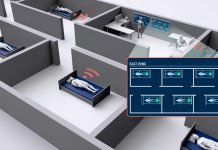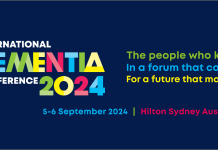This article is part of our showcase of the 2019 Future of Ageing Awards. Suncare was Highly Commended for its work in Reablement / Restorative Care.
Short-Term Restorative Care (STRC) was introduced at Suncare in 2017 as part of a focus on at-home personal care solutions for customers. STRC is an early intervention program designed to improve wellbeing and slow down or reverse functional decline through a coordinated multidisciplinary range of services.
Project Overview
Each STRC packages involves access to therapy, care and equipment, and customised services to meet each customer’s goals for improving or maintaining function. Suncare utilises a holistic wellbeing model that focusses on the customer and their outcomes.
Living an independent life means different things to different people and Suncare strives to meet these expectations with new and innovative service delivery methods.
The program is delivered across South Brisbane, North Brisbane, the Sunshine Coast and Wide Bay.
How it came together
When the Federal Government first announced its Short Term Restorative Care (STRC) initiative in February 2017, Suncare immediately recognised the long term benefits of a program such as STRC.
When a person goes into permanent care, the initial financial cost of the community includes the large expense of maintaining residential care. The individual loses their connection and feelings of security. Furthermore, the community loses the wealth of experience these people bring thus reducing diversity.
Recent studies have suggested that older community members are in fact net contributors to the economy. The STRC package assists in reducing or prolonging the shift from independent living to institutional care. This enables older people to maintain independence, autonomy, and connection to social support. It also avoids the costly option of institutional care, providing a benefit to the broader community.
The Short-Term Restorative Care (STRC) program specifically targets older Australian’s who have been referred by My Aged Care and have been assessed by the Aged Care Assessment Team (ACAT).
To ensure success, participants can receive two episodes of eight-week STRC within a 12 month period. Participants are often referred to the program by their general practitioner (GP) who may have noticed a decline in the person. At Suncare, each package is designed specifically for and with the individual, allowing them to be in the driving seat and set goals on what they want to achieve. Together and under the guidance of the individual’s GP, Suncare develops an eight week plan to provide practical outcomes to improve health, wellbeing and ultimately a happier outlook on life.
Suncare receives funding allocations for STRC from the Australian Government. On its flagship STRC program, Suncare has capacity for 71 participants at any time. With an eight-week program run time, more than 420 people can be part of the STRC program in any given year. The program is managed by Suncare’s dedicated team of allied health and clinical specialists. Suncare has 11 staff dedicated to working with STRC, with six allied health specialists (physiotherapists, occupational therapists and nurses), and a Senior Clinical Coordinator who manages the program.
Suncare is very aware of the potential vulnerability of our customers and takes every effort to ensure they are not disadvantaged, either by the system or by circumstance. While customers are required to pay a co-contribution fee of up to $51.21 per day towards their services, Suncare will continue to deliver services to customers who are financially or socially disadvantaged, regardless of their ability to pay. Care is taken to ensure the client is not singled out, nor led to feel ashamed because of their circumstances.
When Suncare initially started delivering the entirely new STRC program, they embarked on a plan to educate partner organisations and community stakeholders about what the program could do and on client eligibility. These include local National Disability Services, Health Ageing Partnerships (with the Primary Health Network, Sunshine Coast Council and University of the Sunshine Coast), COTA, Aged Care Assessment Teams (ACATs), GP’s, health practitioners, community groups and existing clients.
Bi-monthly meetings are held to give service providers the opportunity to get together and discuss issues of concern, regulatory changes, local issues and to share success stories with other providers. It is also a great opportunity for providers to seek support. Guest speakers are often engaged to talk to the group about items of interest.
There were also challenges involved in delivering these specialised health services in regional areas. Suncare overcame this issue by developing a dedicated STRC team so as not to rely on contracted resources.
Suncare is proud to invest in research that is aligned with its purpose. They are currently partnering with Flinders University to review and identify tools to effectively measure the changes in capacity and capability of clients participating in the Short-Term Restorative Care Program.
Outcomes
Suncare’s successful tender to deliver the Australian Government’s new STRC initiative provided Suncare with 44 of the 475 STRC customer place allocations available nationally. This was more than any other organisation in Australia. Suncare was also offered an additional 27 places in the most recent Aged Care Approvals Round (ACAR), earlier this year – a testament to its management, systems, staff and business model.
Suncare’s success in delivering this package is evidenced through the large number of new customers, filling the allocations detailed above, the improved wellbeing of people receiving STRC through Suncare program, and a corresponding increase in staff needed to support them. Suncare has increased its staff numbers by approx 69 per cent over the past two years.
Suncare’s revenue has gone up by 20 per cent in the past financial year. This revenue translates to an almost 5 per cent improvement in profits, despite considerable increases in admin costs and customer facing roles.
Measurable data for the success of each customer’s STRC package is collected through the Modified Barthel Index score system (MBI), which assesses the extent to which somebody can function independently and has mobility in their activities of daily living.
Suncare’s STRC patients have scored an average of 75, upon entering the program. At the completion of their eight week package, this average increased by an 25 per cent, to a score of 89. Individual cases have presented much higher increases. One customer scoring 66 on the initial assessment, experienced a 39 per cent increase to a final score of 92, on completion of his eight week package.










